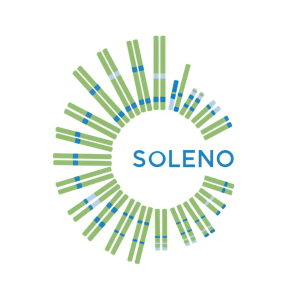Soleno Therapeutics Announces Initiation of Randomized Withdrawal Study of DCCR for the Treatment of Prader-Willi Syndrome
Soleno Therapeutics (NASDAQ: SLNO) announced the initiation of a randomized withdrawal period for Study C602, focusing on DCCR (Diazoxide Choline) Extended-Release tablets, aimed at treating Prader-Willi syndrome (PWS). This pivotal phase of the study involves 80 patients across 22 sites, evaluating the drug's efficacy against a placebo. Positive discussions with the FDA suggest that data could support a New Drug Application. DCCR, designed to relieve symptoms of PWS, has received both Orphan Drug and Fast Track designations.
- Initiation of the randomized withdrawal period signifies a major step in DCCR's development.
- Positive discussions with the FDA regarding potential New Drug Application submission.
- DCCR has received Orphan Drug Designation and Fast Track Designation.
- None.
REDWOOD CITY, Calif., Oct. 03, 2022 (GLOBE NEWSWIRE) -- Soleno Therapeutics, Inc. (Soleno or the Company) (NASDAQ: SLNO), a clinical-stage biopharmaceutical company developing novel therapeutics for the treatment of rare diseases, today announced that it has initiated a randomized withdrawal period of Study C602, an ongoing open-label extension study of DCCR (Diazoxide Choline) Extended-Release tablets for the treatment of Prader-Willi syndrome (PWS).
“Initiation of the randomized withdrawal period of Study C602 represents a significant milestone for our late-stage DCCR development program,” said Anish Bhatnagar, M.D., Chief Executive Officer of Soleno. “As we announced previously, following interactions with the U.S. Food and Drug Administration, we have alignment that data from this portion of Study C602 have the potential to support the submission of a New Drug Application.”
The randomized withdrawal period of Study C602 is a multi-center, randomized, double-blind, placebo-controlled study of DCCR in approximately 80 patients with PWS at 17 sites in the U.S. and 5 sites in the U.K. This randomized withdrawal period consists only of patients currently enrolled in Study C602 and will not enroll any new patients. Upon Institutional Review Board/Ethics approvals at their respective sites, patients who consent to participate in the randomized withdrawal period, will be randomized to receive DCCR or placebo for a period of four months.
About PWS
The Prader-Willi Syndrome Association USA estimates that PWS occurs in one in every 15,000 live births in the U.S. The hallmark symptom of this disorder is hyperphagia, a chronic feeling of insatiable hunger that severely diminishes the quality of life for PWS patients and their families. Additional characteristics of PWS include behavioral problems, cognitive disabilities, low muscle tone, short stature (when not treated with growth hormone), the accumulation of excess body fat, developmental delays, and incomplete sexual development. Hyperphagia can lead to significant morbidities (e.g., obesity, diabetes, cardiovascular disease) and mortality (e.g., stomach rupture, choking, accidental death due to food seeking behavior). In a global survey conducted by the Foundation for Prader-Willi Research,
About DCCR (Diazoxide Choline) Extended-Release Tablets
DCCR is a novel, proprietary extended-release dosage form containing the crystalline salt of diazoxide and is administered once-daily. The parent molecule, diazoxide, has been used for decades in thousands of patients in a few rare diseases in neonates, infants, children and adults, but has not been approved for use in PWS. Soleno conceived of and established extensive patent protection on the therapeutic use of diazoxide and DCCR in patients with PWS. The DCCR development program is supported by data from five completed Phase 1 clinical studies in healthy volunteers and three completed Phase 2 clinical studies, one of which was in PWS patients. In the PWS Phase 3 study, DCCR showed promise in addressing hyperphagia, the hallmark symptom of PWS, as well as several other symptoms such as aggressive/destructive behaviors, fat mass and other metabolic parameters.
About Soleno Therapeutics, Inc.
Soleno is focused on the development and commercialization of novel therapeutics for the treatment of rare diseases. The company’s lead candidate, DCCR extended-release tablets, a once-daily oral tablet for the treatment of Prader-Willi syndrome (PWS), is currently being evaluated in a Phase 3 clinical development program. For more information, please visit www.soleno.life.
Forward-Looking Statements
This press release contains forward-looking statements within the meaning of Section 21E of the Securities Exchange Act of 1934, as amended. All statements other than statements of historical facts contained in this press release are forward-looking statements, including statements regarding timing of any regulatory process or ultimate approvals and determining a path forward for DCCR for the treatment of PWS. In some cases, you can identify forward-looking statements by terms such as "may," "will," "should," "expect," "plan," "anticipate," "could," "intend," "target," "project," "contemplates," "believes," "estimates," "predicts," "potential" or "continue" or the negative of these terms or other similar expressions. These forward-looking statements speak only as of the date of this press release and are subject to a number of risks, uncertainties and assumptions, including the risks and uncertainties associated with market conditions, as well as risks and uncertainties inherent in Soleno’s business, including those described in the company's prior press releases and in the periodic reports it files with the SEC. The events and circumstances reflected in the company's forward-looking statements may not be achieved or occur and actual results could differ materially from those projected in the forward-looking statements. Except as required by applicable law, the company does not plan to publicly update or revise any forward-looking statements contained herein, whether as a result of any new information, future events, changed circumstances or otherwise.
Corporate Contact:
Brian Ritchie
LifeSci Advisors, LLC
212-915-2578

FAQ
What is the significance of Study C602 for Soleno Therapeutics (SLNO)?
How many patients are involved in Study C602 for SLNO?
What is DCCR and its relevance to Prader-Willi syndrome (SLNO)?







